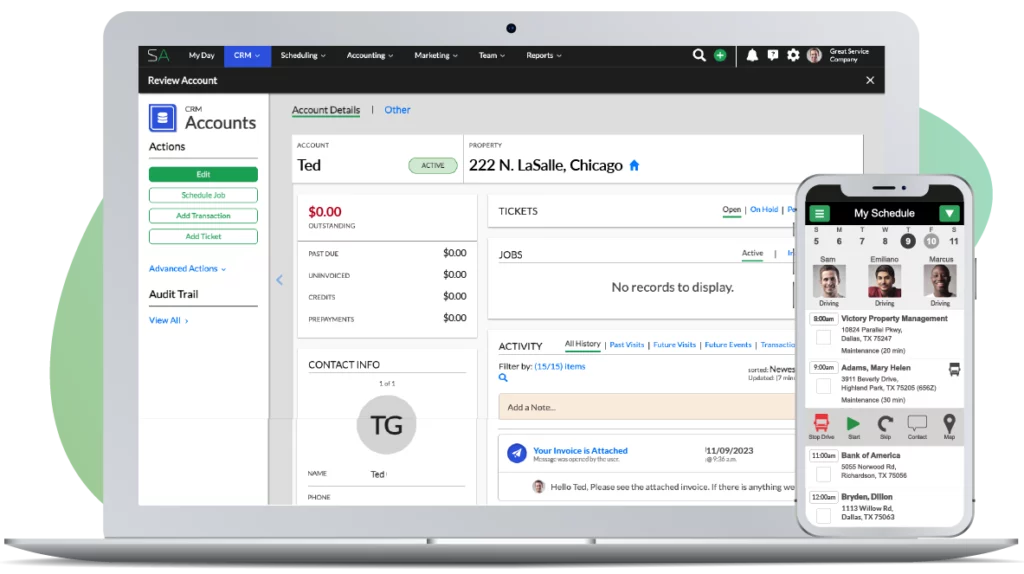Contacting the right person when trying to sell commercial contracts makes all the difference.
Learn the title of the person you should contact when selling to big companies.
Video Transcript:
The question is, I am trying to build the commercial side of my business so I’m selling to commercial clients. Who am I looking for? Who do I talk to? Who do I talk to to get a bid or have the opportunity to bid the work? So, let’s talk through this, but I’m going to give you a couple of names first and then I’ll clarify some stuff.
So, you’re looking for a Property Manager at a property management company. If it’s a small property management company as in its an owner with a couple of assistants, then you might be dealing directly with the owner of the property management company. But, in many cases you’re dealing with a Property Manager at a property management company.
You might be dealing with a Purchasing Manager. So, let’s say that you have a big operation that you’re trying to sell to. So, I’m going to make up a name … Home Depot. I don’t know, I’ve never worked with Home Depot so I don’t know how Home Depot works, but let’s say Home Depot. Home Depot might have a Purchasing Manager over the Home Depot stores. Now, generally, he might have final say or he might sign off, but he’s not necessarily the guy that you talk to to negotiate every deal. What you might end up doing, you might talk to the Manager of the Home Depot. Again, please keep in mind, my example here, I’ve never dealt with Home Depot, I’ve haven’t the faintest idea how Home Depot works, but I’ve dealt with this a lot in both the landscape industry and the commercial cleaning industries. I do have a lot of experience in this area. I’m just using Home Depot to put a name to this.
Home Depot might be structured where, again, might being a very key word, Home Depot could be structure where Home Depot has stores in all of these different markets. Within a market, you would have possibly a Store Manager, I don’t know what they call them in Home Depot, that runs that store. He’s responsible for the P&L of the store, he’s responsible for the store. He may or may not have decision making authority on who his vendors are. I have seen within big corporations that this varies. Some big corporations basically will hire a couple vendors and they will push those vendors down to the Store Manager and other corporations will let the Store Manager make all of their buying decisions, chose all of their vendors because they’re ultimately responsible for their P&L at their store. So, it can vary.
A typical hierarchy tends to be, so we’re no longer talking about a property management scenario. In this example we are assuming that Home Depot operates with a Store Manager. Above that Store Manager, in many cases, will be a District Manager. This will be someone that controls X number of Home Depots and the Store Managers report to this individual. Often above that District Manager might be a Regional Manager that is responsible for some territory within the United States that multiple District Managers report to that individual. Then above that might be a Purchasing Manager. Everybody’s different, but this is a kind of way to think about it. I’ve seen this scenario many, many times.
Now, at a property sometimes you will start with … usually you’ll start with the Manager of that property. You’ll start with the Store Manager in the Home Depot example. They may move you up the food chain and say “Hey, that decision’s made a corporate office.” In that case you need to find out who you need to talk to at corporate office. If it’s made at corporate office, a lot of times now you’re dealing with the Purchasing Manager. In some cases, you may be dealing with the equivalent of a Facility Manager. You could have a Facility Manager at the local Home Depot store that’s responsible for that store or you could have a Facility Manager that roams and covers multiple stores that is essentially over that store.
So example, in the landscape industry, one time I had a client, Neiman Marcus. At Neiman Marcus the person I dealt with there was essentially a Facilities Manager or Facilities Director. I’m not quite sure what his title was. In our local Dallas market, there’s a big mall called North Park and there’s all these other malls and he would have been over any mall that had his Neiman Marcus store within it. Any of the malls in the Dallas-Ft. Worth marketplace where there was a Neiman Marcus store, he would have been at the Facility Manager. Therefore, he was making buying decisions. He would tell us “We need you to do this, we need you to bid that.” He wasn’t working for the mall. He was in charge of the store within the mall, Neiman Marcus.
You might think about this sometimes when you think about a mall you picture “I want to get the landscape for the whole mall.” Well, there is manager of that. Even within that there could be a manager that’s over things like their A/C units within the store or the landscape right directly around their store or the flowerbeds around their store or we did a lot of work around the area where their air conditioning units were, their massive air conditioning units, and we did a lot of gravel work and different types of work, multiple different jobs. They also had warehouses. So we would take care of their warehouses that weren’t anywhere even near the mall. These were in warehouse districts but that one person made all the buying decisions for the different warehouses that we maintained the property for as well as the store connected to the mall. We didn’t mow any of the grass around the mall but we did other things because they were responsible for certain things.
I used to be in the cleaning industry and we would deal with big, big corporations that owned free-standing buildings all over the United States. We would often deal with either a manager at the store level. Let’s say we had a client in Ohio, we would deal with the manager at that property in Ohio. He would make all of his decisions. In other scenarios with direct competitors to this client we took care of, their direct competitors. In other cases, we wouldn’t deal with the manager. Now, the manager would tell us what to do or not to do but we had to deal with the District Manager and the District Manager would approve everything.
So, you’re looking for Property Managers vary, that’s one, Purchasing Managers possibility, Facility Managers is another one, and then it could be the Store Manager or a District Manager or a Regional Manager. There’s other scenarios, but these are the ones that I see most often.
In HOA’s it could be that you deal with the property management company. So, again, you’re dealing with the Property Manager. The HOA could have a property management company, but you’d deal with the President of the HOA or the board of the HOA. You go directly to them and then the property management sort of facilitates the process. In HOA work, I’ve seen both Where I deal or have dealt directly with the property management company and the HOA basically just says “Yeah, we agree we want to do that,” but property management did all the leg work.
I’ve also had the scenario where we do all the work directly with the President of the HOA and the HOA. This is the more predominate one, but understand, I’m not a big HOA person. In my experience, most of my scenarios have been dealing with the HOA President and any board members associated, typically with the President and then one or two choice people that took a big involvement in that part of the HOA, meaning the outdoor services, the perimeter of the property and such.
These are the titles that you’re usually dealing with when you’re getting into the commercial market and you’re trying to sell work into the commercial market.



